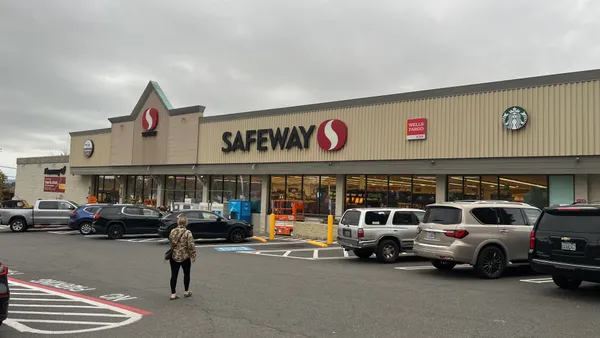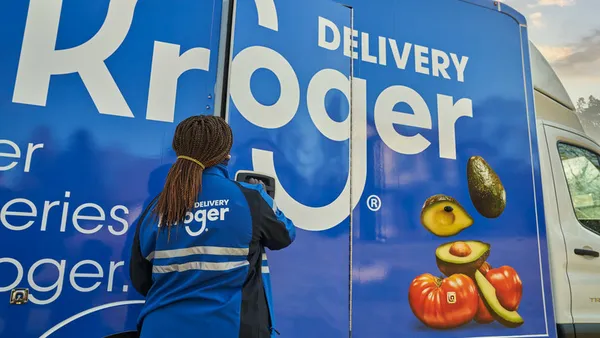Nobody likes to get sued.
Nevertheless, grocers have faced a myriad of lawsuits across various parts of their business, from the flavoring in private label sparkling water to workers wanting to wear "Black Lives Matter" face masks to screen reader compatibility with online features.
To better understand the main legal threats grocers face, Grocery Dive talked with Stephanie Sheridan, head of Steptoe & Johnson LLP’s Retail & E-Commerce Practice Group and managing partner of the firm’s San Francisco office. She specializes in defending grocers, food brands and other retailers in consumer class actions, and has helped retailers implement protective business practices to avoid litigation.
Typically, larger grocers tend to face more lawsuits than smaller ones, but in some areas, like digital accessibility, Sheridan has seen mom and pop stores get sued. Sheridan, who is based in California, said she likes to point her clients to California's strict laws: "If they comply with California law, chances are they’re golden everywhere else."
Given the array of potential consumer-facing issues for retailers, Sheridan also recommends this motto: "Disclosure. Disclosure. Disclosure." "You almost can't over disclose, because if there ever is a claim against you, the grocery store, can say, ‘Look, we disclosed in a very prominent, clear fashion what we meant by this,’” she said.
Here are some of the top legal issues grocers face and steps they can take to help them avoid getting sued, according to Sheridan.
Digital accessibility
Over the past decade, digital accessibility has posed a significant challenge for retailers, Sheridan said. She continues to see grocers get inundated with letters threatening lawsuits, often from the same plaintiff firms.
Grocers’ physical stores count as places of public accommodation under Title III of the Americans with Disabilities Act. The Department of Justice has said it believes Title III applies to websites of places of public accommodation, but has stopped short of enacting specific web content accessibility standards. That's left some courts and lawyers to rely on guidelines from the World Wide Web Consortium, a leading internet standards organization, when evaluating digital accessibility.
The organization's Web Content Accessibility Guidelines (WCAG) provide technical standards with testable criteria at different compliance levels. But it doesn't carry the power of the law, and its many standards can be difficult to fully meet, Sheridan pointed out.
“It is a guideline, and a lot of people regard it as aspirational because it’s almost impossible to 100% meet all the WCAG standards,” she noted.
In addition to the ADA, which is a federal law, several states have their own laws regarding discrimination and businesses. New York, Florida and California are hotbeds for digital accessibility lawsuits, she said.
While Sheridan said it's legally murky how much of an app or website needs to be accessible to someone using assistive technology, like screen readers and braille displays, she said some functions, like the store locator function, online shopping component and employment information, like job postings and applications, are essential.
Keeping online features accessible requires ongoing maintenance by businesses due to how frequently apps and websites get updated, which can potentially introduce technical barriers, experts on accessibility have previously told Grocery Dive. This leaves businesses ripe for getting sued over and over again, Sheridan said.
To help prevent that, Sheridan tells businesses to conduct a digital accessibility audit and advises her clients to figure out best practices to address “low-hanging fruit” to remove barriers. When auditing a site, the “gold standard” is to have a person who is blind conduct the assessment, she noted.
Grocers can work with vendors who specialize in website accessibility compliance, but given that numerous firms have popped up in recent years, Sheridan said grocers need to vet the third party to make sure it would stand by their audit if a legal challenge arises. Along with third-party vendors, she recommends having an internal expert who can continually monitor and audit to watch out for any issues.
She also suggests grocers put an accessibility statement on their website that says they are committed to providing equal access and provides contact information to report an accessibility issue or ask a question.
Labeling
Consumers have shown they're willing to pay more for products they perceive as healthier and better for the environment — and sue if those products don't live up to their claims.
As grocers market brands and continue to develop their own products, they need to be able to back up claims, and should consider making any qualifying language "just as prominent to what the claim is" rather than on the back of product packaging or in smaller types, she said.
Sheridan outlined some of the main labeling woes grocers face:
Ingredients: Class action lawsuits are ramping up against food and beverage companies, and grocers can get hit with claims about mislabeled ingredients.
Misrepresentation and false advertising can include claiming a product is healthier or superior to other products when it isn’t or sounding like it’s free of certain ingredients, like sugar or preservatives, but does contain them, Sheridan said, noting some customers will take advertising literally. Claiming a product doesn’t have an ingredient, like an allergen, when it in fact does contain can pose potential legal — and health — ramifications.
Plaintiff lawyers can sue both the brand and the grocer — it’s more lucrative for them if they try to hit both pockets, Sheridan said, noting grocers can have indemnification clauses with the brands they work with that puts the onus of verifying claims on the brand and forces it to pay the grocer’s legal fees if there's a lawsuit.
Sustainability: With companies looking to capitalize off of consumer demand for eco-friendly products, there has been a slew of consumer and government legal action against brands that shoppers and advocacy groups say are “green-washing,” or exaggerating environmental benefits, Sheridan said. Broad or unqualified claims, like “eco-friendly,” “low-waste,” “green” and “clean” should be explained, she said, recommending grocers turn to the Federal Trade Commission's (FTC) Green Guides for guidance on environmental marketing claims and for specific definitions for terms like "recyclables" and "non-toxic."
“A lot of brands that we work with are developing special logos they put on green items. Others have search filters on their websites for green features, so that way, that allows them to give the consumer a definition of what their logo means without using some of the language that we’ve seen have gotten others in trouble,” Sheridan said, adding grocers can also direct shoppers to third-party certifications that back up claims and provide more information.
Mainly, grocers need to have appropriate evidence to support their sustainability claims, she said. They should also be careful about making a sustainability claim that doesn't apply to the entire product or packaging, but sounds like it does.
Natural and organic: Sheridan has noticed quite a bit of activity with lawsuits over “natural” or “all natural” claims, with plaintiff lawyers often saying those labels are deceptive if the product includes a non-natural or processed ingredient.
Mixing nonorganic items with pricier organic ones poses another legal issue when customers can't distinguish between them from appearance alone, like fresh meat and produce.
Grocers also need to be mindful of the USDA's Natural Organic Program (NOP), which sets regulations for organic agricultural production in the U.S. and for imported products. Sheridan pointed to a case in 2019 where the FTC found that a Floriday-based retailre had made misleading "organic" statements about its personal care products.
Pricing
Deceptive pricing is a “hot topic” for retailers, with claims ranging from misleading advertisements to better-than-they-appear discounts, Sheridan said.
“The general principle is: It’s misleading to the public if you’re giving the public the idea that they’re getting a savings when in fact they’re not,” Sheridan said.
She continued: “If you're saying that something's a former price, make sure that that's right. If you're saying something's on sale, like a store-wide sale, make sure that you're disclosing if there's any exclusions that apply."
For example, if a store has a sign outside that says “20% off” but doesn’t specify what the discount does or does not apply to, a shopper could be misled to believe the sale is store-wide — what plaintiff lawyers call a “bait-and-switch.”
Another issue: Listing a higher reference price for an item that isn’t accurate. Sheridan gave the example of a grocer having a shelf tag for its $3 private label fruit punch that claims “other brands” cost $6 for the same item, even though similar brands next to it on the shelf only cost up to $5.
“The bottom line is, as long as a company's able to show that there's some basis for the higher reference price, that it's offered in good faith [and that] it's a bona fide price for some period of time that's reasonable, then there's nothing wrong with having a discount,” Sheridan said.
Deceptive pricing lawsuits are prevalent in California because of the state’s consumer-friendly laws, she said, noting there have also been many cases in New York, New Jersey, Washington, Oregon and Missouri.
Another pricing area grocers should be aware of involves the inaccurate weighing or measuring of packaged items, Sheridan said. Grocers can get sued for underfilling containers, known as “slack filling,” like putting less cereal in boxes than what's represented to shoppers.
Loyalty programs
Grocers have long used loyalty programs to reward repeat customers with special offers. On the legal front, Sheridan noted two main areas for grocers to be mindful of: misleading deals and consumer privacy laws.
Similar to avoiding deceptive pricing claims, grocers should make sure coupons don’t promise more than they actually offer, Sheridan said.
On the consumer data front, grocers need to make sure they clearly disclose how they plan to use people’s information when they sign up for the rewards program and whether or not the data will get sold to third parties, Sheridan said. Retailers that misrepresent how they use customer data could face a deceptive business practice claim from plaintiff lawyers, she said. Additionally, grocers need to make sure the terms and conditions are easily accessible to people and not obscured.
As part of the California Consumer Privacy Act, people in that state have the right to opt out of the sale of their personal information. Sheridan noted Virginia and Colorado have passed similar laws and that other states are considering similar legislation.
A flurry of nearly 40 new filings since October has claimed companies violate customers' right of publicity by selling their information, Sheridan said.
"We are defending some of these cases, and the obvious response is that you can’t bring a 'publicity' claim without publicity, and these statutes therefore do not apply to the private sale of information," she said. "These cases are still in their infancy, but if courts allow them to move forward, we expect that many retailers will be targeted."












